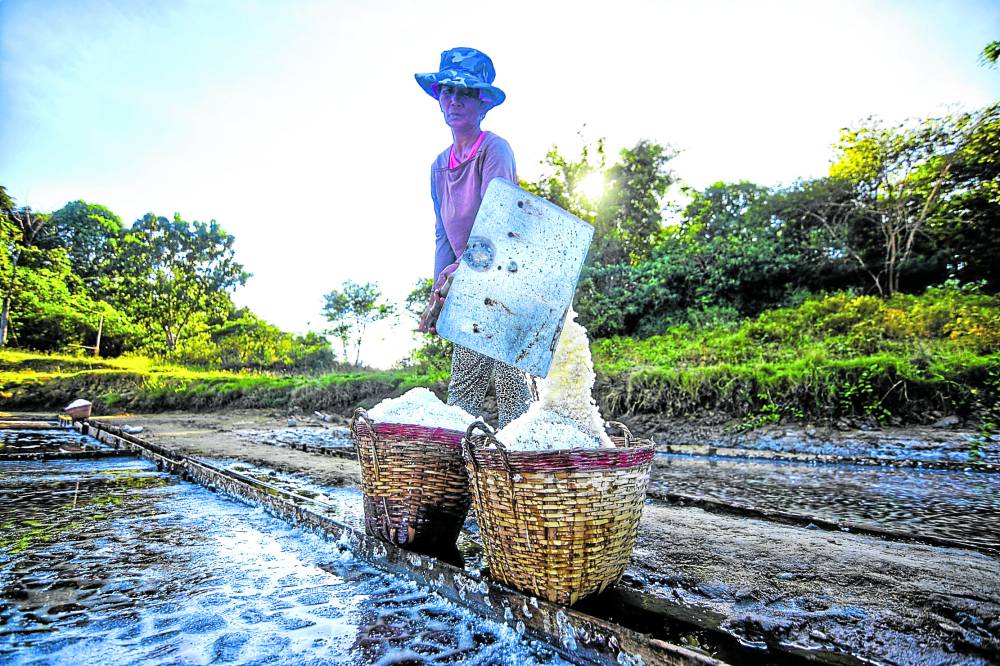
TRADITIONAL PRODUCTION A salt farm worker at Barangay Telbang in Alaminos City, Pangasinan, fills a bamboo basket with mounds of salt using a wooden rake. Salt making is among the major sources of livelihood in the province. —WILLIE LOMIBAO
MANILA, Philippines—After learning that iodine addition to salt is not mandated in other nations, at least two senators are considering voting to scrap the necessity for iodized salt in locally produced minerals.
Senator Cynthia Villar on Wednesday rejected a proposal to make some exemptions in the law so local salt farmers would be allowed to produce non-iodized salt, at least for export.
The 27-year-old Act for Salt lodization Nationwide law mandates local salt farmers to produce iodized salt to address micronutrient deficiency diseases in the country, such as goiter.
“We can’t do that in the Philippines, we can’t. It’s either you remove that or you put that,” Villar said when the suggestion was made during the hearing of the Senate committee on agriculture.
“Kasi alam mo pag hihingi ka ng ganyang exemption, corruption na naman yan e. Hindi pwede yan, it’s either we remove it. Kung ang ibang countries hindi naman nila nire-require, why are we requiring? I remove na lang yan.”
(Because if you ask for an exemption like that, that’s another corruption. If other countries are not requiring it, why do we require it?)
“And then kung ikaw ay may iodine (deficiency), uminom ka ng gamot. Bakit mo pahihirapan lahat ng tao because ikaw ang may iodine deficiency? Uminom ka ng gamot,” Villar said.
(And then if you have iodine [deficiency], drink your medicine. Why make it difficult for everyone when you are the one with iodine deficiency? Just take medicine)
The senator further explained why she does not want to give any exemptions in the law.
“Pag malakas sa inyo e di bibigyan nyo ng exemption, pag mahina sa inyo hindi nyo bibigyan ng exemption. E di lahat na lang tayo magkaroon ng iodine deficiency,” Villar went on.
Senator Nancy Binay agrees with Villar.
Instead of requiring iodized salt, Binay suggested a separate program to address iodine deficiency disorders in the country.
“Siguro kung may iodine deficiency, siguro mas maigi pa yung DOH (Department of Health) magkaroon na lang ng separate program para gamutin itong may mga iodine deficiency kaysa yung buong industriya pipiliting na mag iodized,’” she said.
(Maybe if there is iodine deficiency, the DOH should devise a separate program to address those with iodine deficiency instead of forcing the whole industry to use iodized.)
The Philippine Chamber of Agriculture and Food, Inc. (PCAFI) informed the committee that imported food being sold in the country does not use iodized salt.
“Yung amin pong mga member nagrereklamo dahil yung imported snacks, yung mga chichirya, yung mga noodles na inimport at binebenta sa supermarket hindi gamit ang iodized salt, yung imported,” PCAFI President Danilo Fausto said.
(Our members are complaining because imported snacks, junk foods and noodles sold in the supermarket do not use iodized salt)
“Pero kapag local manufacturer natin ang gagawa, bebenta sa supermarket kelangang iodized ang gamit nila. E yun naman pong ating mga exporter ng snacks e ayaw pong tanggapin sa ibang bansa yung kanilang produkto pag iodized ang gamit dahil sabi ng ibang bansa e treated at fortified yung produkto, ayaw pong bilhin ang produkto,” he added.
(If it’s our local manufacturers, they have to use iodized. And when they use iodized (salt), other countries do not buy their products because they say it is treated and fortified)
An official of the country’s Food and Drug Administration (FDA), Givinia Tuason, explained that the use of iodine for locally produced salt is required under the law except for products intended for export.
“Yun po yung exemption ng batas,” Tuason said, “However, dun nga po sa batas, yung local manufacturers must use iodized.”
However, this requirement of the law prevented local farmers from producing natural salt even for export, Fausto said.
Villar later directed the PCAFI to submit a report that her committee could use to remove the requirement for local farmers.